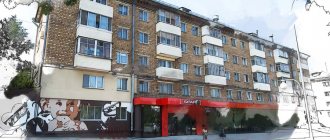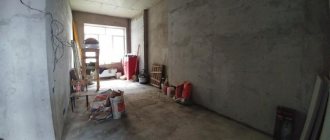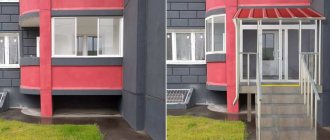Entrepreneurs starting their own business ask this question quite often. This is understandable. There is no profit, there are expenses, and the cash cushion is very thin. That's why entrepreneurs are trying to cut costs as much as possible and try to use their apartment as an office.
- For what purpose do we plan to use the housing?
- What about our legislation?
- Who can use residential premises for business?
- For what purposes can housing be used?
- What threatens entrepreneurs for using an apartment or house in violation of its purpose?
For what purpose do we plan to use the housing?
We are for business development and therefore we will try to answer this question as fully as possible.
In reality, entrepreneurs are looking for answers to two different questions:
- Is it possible to run a business or engage in entrepreneurial activity in an apartment, that is, use the apartment for an office, warehouse or production.
- Is it possible to register a legal entity in an apartment.
The first question is mainly asked by entrepreneurs who either have limited financial resources or who simply do not need to rent any additional premises.
Where to look for an office for rent: TOP 7 main sources of information on the Internet.
And on the second side are also those who want to start a business through a legal entity, usually a limited liability company.
Normative base
In general, an apartment can be used for business activities.
You can also register a company in an apartment or residential building, or more precisely at the address of the apartment or house.
There are certain nuances that we will now consider.
If we talk about the legislation that regulates this issue, we are talking about the following documents:
- Civil Code of the Russian Federation.
- Housing Code of the Russian Federation.
- Code of Administrative Violations of the Russian Federation
- Criminal Code of the Russian Federation
- Federal Law of 08.08.2001 N 129-FZ “On state registration of legal entities and individual entrepreneurs”
Further we will often refer to these documents when studying our issue.
Cost and terms
Coordination, collecting papers and going through authorities can take a lot of time. It is impossible to give exact dates, since each case is individual. On average, the procedure can take from 2 to 6 months.
Reference! The cost of the procedure is strictly individual.
Approximate prices:
- approval of project documents - about 5 thousand rubles;
- drawing up a project plan - from 3 thousand rubles;
- coordination with the housing inspection - from 10 thousand rubles;
- production of a new technical passport - from 2000 rubles.
Additional costs may apply.
Who can register a business in a residential premises?
Let's first figure out who can be registered in a residential premises for the purpose of carrying out business activities.
- Self-employed
- Individual entrepreneurs
- Legal entities.
Self-employed are individuals and individual entrepreneurs who receive income from their professional activities without an employer and without hiring employees under employment contracts, as well as income from the use of property.
Currently, this regime is not valid throughout the country, but already in the second half of 2021. they plan to extend it to all constituent entities of the Russian Federation.
Self-employed, for example, can be those who provide the following services:
- provide cosmetology services
- take photographs and videos
- sell their own products
- provide legal advice
- provide accounting services
- rent out residential property
- provide cargo and passenger transportation
- provide repair and construction services
More detailed information on registration issues, permitted types of activities, and tax rates can be found in the Federal Law of the Russian Federation “On conducting an experiment to establish a special tax regime “Tax on professional income” N 422-FZ.
Individual entrepreneurs can be registered at their place of residence in accordance with clause 3 of Art. 8 FZ-129. The law does not contain any restrictions regarding registration at the residential address.
It’s a little more complicated when it comes to registering a legal entity.
The same Federal Law-129 establishes that “State registration of a legal entity is carried out at the location of its permanent executive body, and in the absence of a permanent executive body - another body or person authorized to act on behalf of the legal entity by virtue of law, other legal act or constituent document, unless otherwise provided by this Federal Law.” The same is stated in Art. 54 Civil Code of the Russian Federation.
Translated from legal into normal language, this means that a legal entity can be registered at the residence address of the founder (one of the founders), who is also its sole executive body.
At the same time, if the founder and director are not the owners of the housing, then it is necessary to obtain consent from all owners of the residential premises for the possibility of registering a legal entity at the address of the apartment or house.
Is it possible to use residential premises for an office or other type of business activity?
The general approach is formulated in Art. 17 of the Housing Code of the Russian Federation, which establishes that any residential premises can be used for professional activities or individual entrepreneurial activities by its owner or persons legally residing in this premises. That is, individual entrepreneurs and self-employed people can use their housing for business activities.
By the way, the same applies to employees who work remotely, which has become increasingly popular lately.
Can a legal entity use an apartment for an office? Formally, it seems not, since it is not clearly stated anywhere. At the same time, we believe that it very well can. Since a legal entity can be registered at the address of the director, the director has the right to carry out his professional activities in his apartment or house, while simultaneously representing the legal entity.
If we really go too far in our reasoning, then employees who work under employment contracts with companies from home, from a formal point of view, use their housing to carry out the business activities of this legal entity and make a profit for their company.
Thus, it turns out that legal entities can also use housing for business purposes.
Required documents
To obtain permission to carry out work, the housing inspectorate will need to provide:
- statement;
- technical passport from BTI;
- floor plan;
- plan-project;
- technical report from the author of the house (if the reconstruction affects load-bearing structures);
- photographs of the wall where the entrance will be located;
- written consent of the residents.
Restrictions on the use of housing for business
Another thing is that there are certain types of restrictions regarding how housing can be used.
For example, the same art. 17 of the RF Housing Code prohibits the use of housing for the creation of industrial production, hotels and, oddly enough, missionary activities. However, one should not conclude that all other types of business activities in apartments and residential buildings are permitted.
Business activity must not violate:
- rights and legitimate interests of other residents of the apartment and neighbors.
- fire safety requirements.
- sanitary, hygienic, environmental and other legal requirements.
In other words, you will not be able, for example, to open a store in your apartment, as this will disturb the peace and interests of other residents of the apartment or neighbors.
Also, you will not be able to carry out licensed activities. For example, banking or educational, since to obtain a license you must own or lease non-residential premises.
In fact, it is also unlikely that it will be possible to create a full-fledged office in an apartment, since in this case fire safety requirements and sanitary standards may be violated.
From all this we can conclude that, in general, residential premises can be used, but only for limited types of activities, as an office, for example, and only in a limited way. When a very limited number of people work in an apartment or house. Otherwise, there is a risk of violating sanitary rules and, more importantly, fire safety.
If your business goes beyond the local office, you need premises to accommodate a large number of employees, obtain a license, open a retail or restaurant business, then you need to buy or rent non-residential premises.
Purchase of commercial real estate by individuals and legal entities: 6 stages and step-by-step instructions.
In this case, you can turn to professionals, for example, who will find the optimal premises for your business.
Step-by-step approval
For approval you need:
- Develop a project plan. This must be entrusted to specialists with SRO approval.
They will analyze the condition of the building, take measurements and draw up a graphic plan of the entrance opening and stairs. If, in addition to work on the equipment of the entrance group, redevelopment of other elements is required, then the project will need to be done to re-equip the entire room. To develop a project, you need a technical passport of the premises. - Next, you will need to obtain written consent from 2/3 of the residents of the apartment building. The owner needs to contact the management company or HOA that maintains the building and agree on a time and place for a meeting of residents in order to obtain signatures from them.
- Then you need to coordinate the project with the BTI, Ministry of Emergency Situations, SES and fire supervision , and then contact the local government with all the documents to obtain permission.
- Based on the received permission, you can begin work .
- As soon as the entrance is made, you need to invite the housing commission . If the work is done in accordance with all building codes and in accordance with the project plan, then the commission members will give the owner an act of redevelopment.
- The final stage is to contact the BTI to change the data in the cadastral and technical passport, and to the Unified State Register to amend the certificate of ownership.
Responsibility for conducting commercial activities in residential premises.
Article 7.21 of the Code of Administrative Offenses of the Russian Federation determines that for the use of housing for other purposes, a fine in the amount of 20,000 - 30,000 rubles can be imposed.
This is currently the only sanction specifically for using residential premises for other purposes.
What other sanctions may be imposed. The most serious ones relate to the area of fire safety, since the consequences of non-compliance are the most serious. Of course, these requirements also apply to non-residential premises, but non-residential premises are checked more often, so the likelihood of dire consequences is still less, although it is not completely excluded.
Residential premises are checked much less frequently and because of this, the risks for people who stay in residential premises and use them for other purposes are much higher. Unfortunately, quite often we hear about fires in residential premises in which people suffer due to their use for other purposes and in violation of fire safety rules.
In case of violation of fire safety rules, the degree of liability depends on the severity of the consequences. From fines to prison.
Article 20.4. Code of Administrative Offenses of the Russian Federation Violation of fire safety requirements. From 200,000 to 1,000,000 rubles, as well as suspension of activities and disqualification.
Article 219 of the Criminal Code of the Russian Federation. Violation of fire safety requirements. From a fine to 7 years in prison.
Therefore, you should take a very responsible approach to resolving the issue of using residential premises for purposes for which it is not intended.
How to choose an office? Instructions and checklist for choosing an office.
Summary
- Registration of an individual entrepreneur and a legal entity in residential premises is possible.
- possible to use residential premises as an office, subject to the restrictions established by law .
- To carry out activities that may violate the rights and legitimate interests of other residents of the apartment or residential building and neighbors, licensed types of activities, production, it is necessary to purchase or rent non-residential buildings and premises.
- For violation of the rules for the use of residential premises, disciplinary, administrative or criminal liability .
Requirements for the entrance group
The entrance group is a set of architectural and technical components that make the entrance to the building as comfortable and safe as possible. Its arrangement is regulated by construction SP 59.13330.2016, SP 54.13330.2016, SP 31-107-2004.
Space requirements for access to non-residential premises are classified according to specifics:
- Design and planning - the presence of a canopy or canopy, lighting of the entrance and steps, the presence of a porch higher than 0.45 m from the ground level, a ramp, handrails, a platform for entering with a width of 1 m.
- Emergency and fire safety - cover the nuances of safety of escape routes: opening of entrance doors to the outside, non-combustible structural materials, adequate width of stairs and openings.
- Thermal insulation - the use of a double vestibule, and in cold regions - an artificial air curtain.
If the conditions of the local area allow, the object must have a separate entrance for vehicles, including a parking lot and a pedestrian path leading from it.








